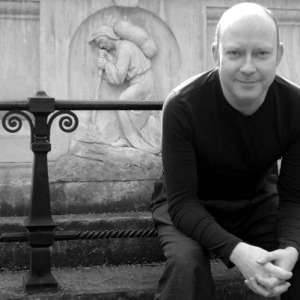A man of many projects, Simon Barraclough is well placed to guide our students towards successful sequences in his new spring term course, Killer Serials: Sequences, Groups and Multi-part Poems.
All three of his collections hinge on the strength of their sequences; my personal favourite is the series of heart poems in Neptune Blue (Salt, 2011), in which his heart is described variously as a Wikipedia stub, a lump of pizza dough, and a starfish trapped in his chest. We spoke to Simon about Anne Carson, poems inspired by the film Psycho, and writing 121 poems about the sun.
You’ve published a lot of sequences in your books and as part of commissioned projects, could you tell me how they came to become such a big part of your poetic practise – was there another poet who inspired you?
Simon: I’m not sure, it wasn’t a conscious decision, just the way my imagination tends to orbit around themes. I like the way sequences nourish the mind and keep the imagination engaged over time while allowing other more disconnected poems to appear outside the realm of the sequence. As a youngster I was drawn to themed books like Ted Hughes’s Season Songs, (Faber & Faber, 1976), and during a dismal spell of commuting in the 90s I read Berryman’s The Dream Songs, (Farrar Straus Giroux, 1969), and it has remained a constant touchstone for me.
I see that your course covers Anne Carson – presumably you’ll look at her verse novel, Autobiography of Red. Do you have any thoughts on how Anne Carson manages to write complete narrative arcs in a way few other poets have managed? And what advice would you give to a student looking to achieve something similar, (other than ‘don’t even bother’)?
Simon: I actually want to look at NOX in the light of Tennyson’s ‘In Memoriam’ and think about their similarities and differences. Carson thrives in the shadow zone between genres and disciplines and I hope the course will step into this area too. This is why we’ll also be looking at ‘non-poets’ like Roland Barthes. As for achieving something similar: come to the class and we may well find a way.
I hear you’re writing 121 poems about the sun – how’s that going? And how do you avoid stagnation when continually trying to approach the same subject in a new way?
Simon: It’s going well, thanks, and the coming year is going to involve several events, a regular blog and some travel related to the project. Trying to keep the subject fresh and surprising is a challenge but a really productive one. I’m just keeping an open mind and trying to think laterally.
The Psycho Poetica book, (Sidekick books, 2012), can be looked at as sequence you’ve curated rather than written entirely yourself – could you tell me a bit about the process of putting it together? How easy was it to do?
Simon: Once the idea was formulated (12 poets, 12 randomly allotted slices of Psycho, 12 new poems) it was fairly easy to manage. Poets were very keen, such is the draw of Hitchcock’s classic, and musicians were also keen to pay homage to Bernard Herrmann. The trickiest part was, of course, finding funding and venues but in the end we performed it many more times than I had originally planned.
Is there a stage students need to have reached in their poetic development before they sign up to this course? And what do you hope students will accomplish before the course is over?
Simon: The class is aimed at the ‘intermediate’ level and upwards, so it’s for anybody with a few years’ experience of writing behind them. Students will be required to work on a sequence they’ve already started or start a brand new sequence for the class. The course will be nicely balanced between reading and workshopping. I hope students will progress well with their sequences and gain a broad understanding of the different approaches and possibilities that poetic sequences offer.
Finally, what books should students planning on taking your course buy themselves for Christmas?
Simon: I once saw Donald Spoto give a lecture on Hitchcock’s Vertigo and when he was asked which books he would recommend he said, ‘Well, mine of course. I’d be a fool not to.’ That still tickles me and it’s my answer here! But I’d also recommend Berryman’s The Dream Songs, (Farrar Straus Giroux, 1969), Roland Barthes’ A Lover’s Discourse, (Penguin, 1990), or Phillip Sidney’s Astrophel and Stella.
If you think you’d like to get more serious about serials, then you can book your place on Simon’s course online, or call 0207 582 1679.

Add your Reply
You must be logged in to post a comment.